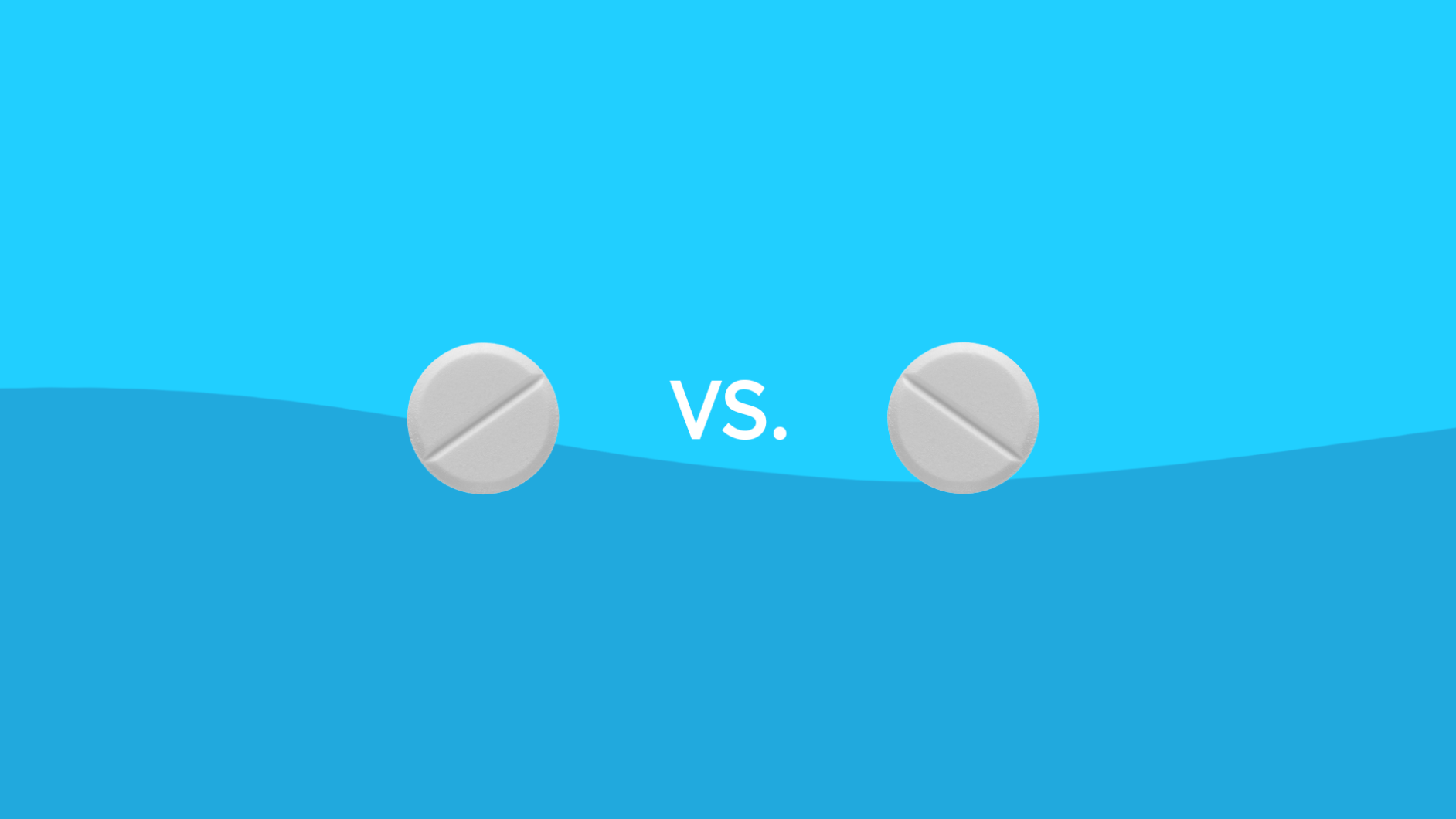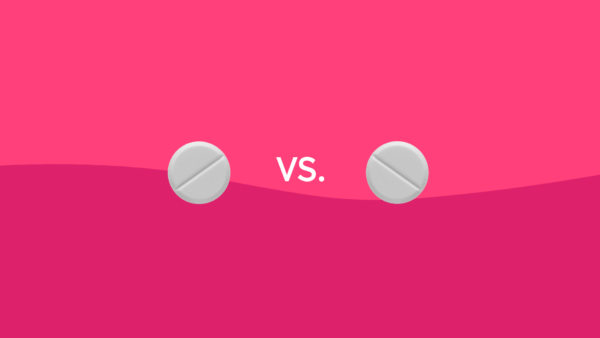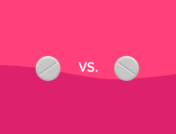Drug overview & main differences | Conditions treated | Efficacy | Insurance coverage and cost comparison | Side effects | Drug interactions | Warnings | FAQ
Valium and Ativan are prescription medications used to treat anxiety among other mental health conditions. Both Valium and Ativan are part of a class of medications known as benzodiazepines (sometimes called “benzos”). They work by enhancing the activity of GABA (gamma-aminobutyric acid) in the brain. GABA is an inhibitory neurotransmitter that helps reduce excess neuronal activity.
Valium and Ativan can only be obtained with a valid doctor’s prescription. Because both drugs may have a potential for abuse and dependence, they should only be taken with proper medical advice.
What are the main differences between Valium vs. Ativan?
Valium is known by its generic name diazepam. It is used to treat symptoms of anxiety, muscle spasms, and seizures in adults and children aged 6 months and older. Valium is considered a long-acting benzodiazepine because it is eliminated slowly from the body. It can take several days for Valium to be cleared from the body.
Ativan—generic name lorazepam—is indicated to treat anxiety symptoms although it can also be used for insomnia and certain seizures in adults and children 12 years and older. Compared to other benzodiazepines, Ativan is considered an intermediate-acting benzodiazepine with a half-life of around 18 hours.
| Main differences between Valium and Ativan | ||
|---|---|---|
| Valium | Ativan | |
| Drug class | Benzodiazepine | Benzodiazepine |
| Brand/generic status | Brand and generic available | Brand and generic available |
| What is the generic name? | Diazepam | Lorazepam |
| What form(s) does the drug come in? | Oral tablet Injection (generic) |
Oral tablet Injection |
| What is the standard dosage? | 2 to 10 mg, two to four times daily | 2 to 3 mg per day divided into two or three doses |
| How long is the typical treatment? | Short-term use, not longer than 4 months | Short-term use, not longer than 4 months |
| Who typically uses the medication? | Adults and children older than 6 months of age | Adults and children older than 12 years of age |
Want the best price on Valium?
Sign up for Valium price alerts and find out when the price changes!
Conditions treated by Valium vs. Ativan
Valium is approved to treat anxiety disorders, seizures, and muscle spasms. Valium is recommended to be used in combination with other therapies for treating seizure disorders. Valium is also approved to treat alcohol withdrawal symptoms such as agitation, tremors, delirium, and hallucinations. Some people may also be prescribed Valium off-label as an anxiolytic or sedative before surgeries.
Ativan is approved for anxiety disorders, insomnia, and seizures. However, it also has other uses such as off-label treatment of muscle spasms and alcohol withdrawal symptoms. Ativan can be used to help with sedation before certain surgeries.
Valium or Ativan may be prescribed based on what symptoms you are experiencing. An evaluation by a healthcare provider will be needed in order to get a prescription for one of these medications. Valium and Ativan are not recommended for long-term use in most cases.
| Condition | Valium | Ativan |
| Anxiety disorders | Yes | Yes |
| Alcohol withdrawal syndrome | Yes | Off-label |
| Skeletal muscle spasms | Yes | Off-label |
| Seizures | Yes | Yes |
| Insomnia | Off-label | Yes |
| Sedation | Off-label | Off-label |
Is Valium or Ativan more effective?
Valium or Ativan may be more effective based on what is being treated. Because everyone may process drugs differently, effectiveness may differ based on personal factors such as other conditions or other medications being taken (see drug interactions below).
Valium and Ativan have been shown to be equally effective as a benzodiazepine. In children, both benzodiazepines are effective for treating status epilepticus, a severe type of seizure, in children. Another trial found that both drugs are also equally effective for alcohol withdrawal syndrome. In a randomized, clinical trial, diazepam and lorazepam had comparable safety and efficacy.
Valium and Ativan mainly differ in their duration of action with Valium taking longer to clear from the body. This may affect other factors of treatment such as possible side effects.
Proper evaluation from a doctor or healthcare provider is necessary to find the best treatment option. Treatment will be tailored based on symptoms and severity.
Want the best price on Ativan?
Sign up for Ativan price alerts and find out when the price changes!
Coverage and cost comparison of Valium vs. Ativan
Purchasing Valium with a prescription is a straightforward process. It is often covered by Medicare and insurance plans. However, most insurance plans will only cover generic Valium. The average retail price for diazepam is around $60. Using a SingleCare discount card has the advantage of lowering the price to around $12-$48.
Ativan is a prescription drug that can be obtained with most insurance plans. Depending on which pharmacy you purchase from, Ativan can cost over $800. Use a SingleCare lorazepam coupon to get the generic drug for about $20.
| Valium | Ativan | |
| Typically covered by insurance? | Yes | Yes |
| Typically covered by Medicare? | Yes | Yes |
| Standard dosage | 2 mg tablets | 0.5 mg tablets |
| Typical Medicare copay | $0-$12 | $0-$25 |
| SingleCare cost | $12-$48 | $20 |
Common side effects of Valium vs. Ativan
The most common side effects of Ativan include CNS (central nervous system) effects such as sedation, dizziness, and unsteadiness. Other side effects may include weakness, confusion, and nausea.
Side effects of Valium include drowsiness, fatigue, muscle weakness, and problems with coordination (ataxia). Other side effects some people report experiencing include nausea, dizziness, and confusion.
More serious side effects of Valium and Ativan can include respiratory depression (slowed breathing), especially when taken in high doses. Other adverse effects can include memory problems (amnesia), low blood pressure, blurred vision, paradoxical agitation, irritability, and sleep disturbances.
| Valium | Ativan | |||
| Side Effect | Applicable? | Frequency | Applicable? | Frequency |
| Sedation | Yes | *not reported | Yes | 15.9% |
| Muscle weakness | Yes | * | Yes | 4.2% |
| Drowsiness | Yes | * | Yes | * |
| Fatigue | Yes | * | Yes | * |
| Ataxia | Yes | * | Yes | * |
| Dizziness | Yes | * | Yes | 6.9% |
| Unsteadiness | Yes | * | Yes | 3.4% |
| Nausea | Yes | * | Yes | * |
| Confusion | Yes | * | Yes | * |
This may not be a complete list. Consult your doctor or pharmacist for other side effects.
Source: DailyMed (Valium), DailyMed (Ativan)
Drug interactions of Valium vs. Ativan
Ativan may have fewer drug interactions compared to Valium. This is because it is metabolized in the liver by a process called glucuronidation. Valium, on the other hand, is processed more heavily by CYP liver enzymes. Ketoconazole, clarithromycin, or similar drugs can affect the CYP liver enzyme process and alter the effectiveness or increase the side effects of these drugs.
Benzodiazepines like Valium or Ativan can interact with other drugs that have CNS side effects such as antipsychotics, anticonvulsants, barbiturates, antidepressants, and sedatives. Taking benzodiazepines with these drugs can increase the risk of adverse side effects such as drowsiness, sedation, confusion, and impaired coordination.
Taking probenecid can decrease the metabolism of Valium or Ativan when taken together. This can lead to a prolonged effect of the benzodiazepine and increase the risk of withdrawal or adverse side effects.
Theophylline and aminophylline can reduce the sedative effects of benzodiazepines such as Valium or Ativan. These medications should be discussed with a doctor to prevent changes in effectiveness.
| Drug | Drug Class | Valium | Ativan |
| Oxycodone Hydrocodone Morphine Codeine Tramadol |
Opioids | Yes | Yes |
| Phenytoin Carbamazepine Lamotrigine |
Anticonvulsants | Yes | Yes |
| Phenobarbital Pentobarbital Secobarbital |
Barbiturates | Yes | Yes |
| Haloperidol Olanzapine Risperidone |
Antipsychotics | Yes | Yes |
| Amitriptyline Desipramine Doxepin Nortriptyline |
Tricyclic antidepressants | Yes | Yes |
| Rasagiline Isocarboxazid Phenelzine Selegiline Tranylcypromine |
Monoamine oxidase inhibitor (MAOI) | Yes | Yes |
| Probenecid | Uricosuric | Yes | Yes |
| Theophylline Aminophylline |
Methylxanthine | Yes | Yes |
| Erythromycin Clarithromycin Telithromycin Rifampin |
Antibiotic | Yes | No |
| Ketoconazole Itraconazole |
Antifungal agent | Yes | No |
This may not be a complete list of all possible drug interactions. Consult a doctor with all medications you may be taking.
Warnings of Valium vs. Ativan
Valium and Ativan, like other benzodiazepines, should be avoided while taking opioids. Taking benzodiazepines and opioids together can increase the risk of respiratory depression, coma, and even death. Benzodiazepines and opioids have similar adverse CNS effects such as drowsiness which can be compounded when taking them together.
Benzodiazepines have an increased risk of withdrawal when therapy is abruptly stopped. Withdrawal symptoms can include headache, insomnia, and increased anxiety. It is important to taper off these drugs slowly to reduce the risk of withdrawal.
Both Valium and Ativan are labeled as Schedule IV controlled substances by the DEA. In other words, they have some potential for abuse and dependence. Therefore, they are not generally recommended for long term use.
Valium and Ativan are not recommended during pregnancy. Taking benzodiazepines has been associated with birth defects. Both drugs are in pregnancy category D, which means that studies have shown fetal risk with using them.
Frequently asked questions about Valium vs. Ativan
What is Valium?
Valium is a prescription medication used to treat anxiety disorders, alcohol withdrawal, and muscle spasms. It is a long-acting benzodiazepine that can treat adults and children aged 6 months and older.
What is Ativan?
Ativan is a prescription medication that is approved for anxiety disorders, seizures, and insomnia. It is an intermediate-acting benzodiazepine that can treat adults and children aged 12 years and older. Other intermediate-acting benzodiazepines include Xanax (alprazolam) and Klonopin (clonazepam).
Are Valium and Ativan the same?
No. Valium is a longer-acting medication that can take a few days to be cleared from the body. They also have different age restrictions, side effects, and approved uses.
Is Valium or Ativan better?
Valium and Ativan have been shown to be equally effective. However, their effectiveness depends on the individual and the problem being treated. Ativan has fewer drug interactions than Valium.
Can I use Valium or Ativan while pregnant?
No. Valium or Ativan should not be used while pregnant. Benzodiazepines can increase the risk of birth defects and developmental problems.
Can I use Valium or Ativan with alcohol?
It is not recommended to consume alcohol while on benzodiazepines. Doing so can increase the risk of CNS depressant effects such as drowsiness and dizziness.
What is stronger, Valium or Ativan?
Both medications start working relatively quickly. However, Valium stays in the body longer than Ativan. Because Ativan is cleared faster, it may have a higher risk of withdrawal.
How dangerous is it to mix Ativan and Valium?
Benzodiazepines should not be mixed. Taking Ativan and Valium together can lead to overdose. This can then lead to severe respiratory depression, coma, and/or death.
Which is stronger for anxiety, Valium 5mg or Ativan 1mg?
Valium and Ativan are dosed differently depending on the severity of anxiety. Valium can be taken up to four times per day while Ativan can be taken two or three times per day. It is best to talk with a doctor to decide which benzodiazepine will work better for your anxiety.





